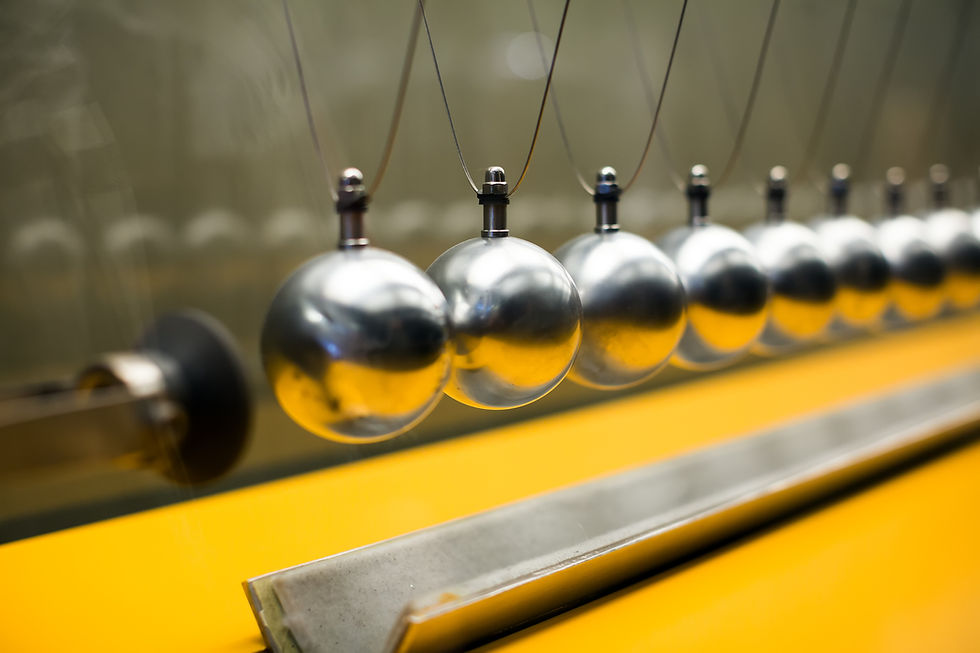Deja Vu : Can You Really Predict The Future?
- Samir Tusneem

- Feb 4, 2021
- 4 min read
Updated: Mar 4, 2021

Have you ever found yourself talking to your friend and thinking that you have had the same exact conversation before? If so, you’re not going crazy, and you are not predicting the future; you are experiencing deja vu. As nerve-racking and confusing as this feeling may be, it is completely normal and everyone experiences it from time to time.
So what is exactly is deja vu? Deja vu, which is French for “already seen,” is a phenomenon that continues to puzzle scientists to this day. It’s the enigma that makes you believe that a certain situation has happened in the past, even though it hasn’t. The common misconceptions of deja vu are that it means you have an underlying mental disorder, you are experiencing supernatural thoughts, they are signs of cognitive deficiency, and that they are messages regarding past lives. However, none of these are true. In fact, deja vu is actually your brain simply interpreting a familiar situation as something that has already happened before.
In order to further figure out the truth behind this puzzling feeling, scientists have conducted experiments to simulate an environment that triggers deja vu. Using games and even virtual reality, researchers have been able to apprehend a concrete idea of what exactly causes people to experience this phenomenon.
Anne Cleary, a cognitive psychologist at Colorado State University, has previously investigated the source of deja vu through her experiments and research. She debunked the theory that deja vu indicates the ability to predict the future, in which she clarified that a person experiencing deja vu is no more likely to accurately predict what they’re going to see around a corner than someone who is simply guessing. She has come to a possible conclusion that deja vu is simply the result of someone experiencing a similar situation.
“We cannot consciously remember the prior scene, but our brains recognise the similarity. That information comes through as the unsettling feeling that we’ve been there before, but we can’t pin down when or why,” Cleary stated.
“My working hypothesis is that deja vu is a particular manifestation of familiarity. You have familiarity in a situation when you feel you shouldn’t have it, and that’s why it’s so jarring, so striking.”
To test her hypothesis, Cleary put 298 people in an experiment to test whether or not they experience deja vu in response to certain conditions. Cleary and her team built environments in the computer game The Sims, in which the layouts were spatially the same, but different when it came to the theme, such as a garden and a junkyard. In this study, participants were asked to watch videos that showed a walkthrough of a series of scenes, with each one opening up with a voice stating the name of the scene.
After, they were shown a series of test videos, which were different from the study videos, but half of them were laid out exactly the same. At a certain point, the participants were asked if they were experiencing deja vu and whether or not they were confident that they could predict what the next turn would be. About half of the participants reported a feeling of deja vu, but they weren’t any more likely to guess the correct answer than the participants who guessed, thus demonstrating that the ability to predict the future is not real.
Another scientist decided to take a different approach to find the truth behind the enigma. Akira O’Conner, a researcher at the University of St Andrews, decided to use functional magnetic resonance imaging (fMRI) to measure brain activity in correlation to potential deja vu triggers.
“We imaged people’s brains as they underwent a procedure that generates sensations likened to deja vu,” O’Conner stated in his blog. His results came down to the idea that the frontal regions of the brain are filing through memories and sending signals if there is a memory error, exemplifying the team’s claim.
To further establish their hypothesis, O’Conner and his team used an experiment to trigger deja vu within participants. In the experiment, the subjects read a list of related words such as bed, dream, night, pillow, but not the word that relates all of them - sleep. When the subjects were asked whether or not they heard the words on a list, they claimed that they heard the word “sleep,” which served as a false memory. Interestingly enough, when asked whether or not the subjects heard any words beginning with the letter “s,” none of them stated that they did.
As spooky as the phenomenon is, deja vu is simply just the brain recalling familiar situations and interpreting them as false memories. As cool as it would be to be able to predict the future, it simply is not possible through deja vu. Everyone experiences deja vu, and it is completely normal. Experiencing this sensation does not indicate any sort of mental illness or cognitive abnormality, and it is simply just a false memory as a result of a familiar situation. So the next time you are playing a game and feel like you have done the exact same moves before, just know that it is only deja vu playing with you once again.
Sources
Prigg, Mark. “Scientists Solve the Mystery of Déjà Vu.” Mail Online, 30 Jan. 2021, www.dailymail.co.uk/sciencetech/article-3745989/Scientists-solve-mystery-d-j-vu-say-NOT-experiencing-sign-memory-failing.html.
Stierwalt, Everyday Einstein Sabrina, and Everyday Einstein Sabrina Stierwalt. “Can Science Explain Deja Vu?” Scientific American, 31 Jan. 2021, www.scientificamerican.com/article/can-science-explain-deja-vu.



Comments